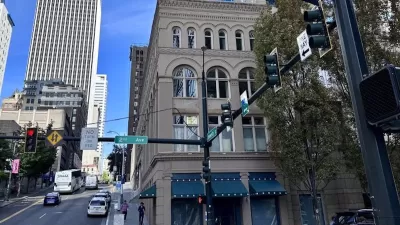In a recent address to the Conference on Economic Opportunity and Inequality, chairwoman of the Federal Reserve Janet Yellen portrayed the stark inequalities growing within American society.
As discussed by John Cassidy in The New Yorker, Janet Yellen's opening remarks to a conference in Boston were entirely devoted to outlining inequalities in the United States. As Yellen stated, "It is no secret that the past few decades of widening inequality can be summed up as significant income and wealth gains for those at the very top and stagnant living standards for the majority. I think it is appropriate to ask whether this trend is compatible with values rooted in our nation’s history, among them the high value Americans have traditionally placed on equality of opportunity."
While the Great Recession had a sharp impact on top incomes as a result of the declining stock market, those inequalities since then have resumed widening, with 2013 inequality levels at nearly those of peaking pre-recession times. As Cassidy writes, "Turning to wealth, which includes financial assets, real estate, and durable goods, such as cars, Yellen noted that the pattern was the same—except the increase in inequality had been even more stark. In 1989, the richest five per cent owned fifty-four per cent of over-all wealth. By 2010, that figure had risen to sixty-one per cent. And by 2013, it had reached sixty-three per cent."
In addition to touching on the net worth (debts, and mortgage debts subtracted from the summed value of all assets a family owns) of top Americans, Yellen discussed how "[i]n 2013, the average net worth of the sixty-two million households in the bottom half of the distribution was eleven thousand dollars."
Yellen went on to describe how the entrepreneurial spirit of America leads to people founding their own businesses, and moving up the income distribution, is also in trouble, "it appears that it has become harder to start and build businesses... The pace of new business creation has gradually declined over the past couple of decades... [and] may well threaten what I believe likely has been a significant source of economic opportunity for many families below the very top in income and wealth."
FULL STORY: Rising Inequality: Janet Yellen Tells It Like It Is

Alabama: Trump Terminates Settlements for Black Communities Harmed By Raw Sewage
Trump deemed the landmark civil rights agreement “illegal DEI and environmental justice policy.”

Study: Maui’s Plan to Convert Vacation Rentals to Long-Term Housing Could Cause Nearly $1 Billion Economic Loss
The plan would reduce visitor accommodation by 25% resulting in 1,900 jobs lost.

Planetizen Federal Action Tracker
A weekly monitor of how Trump’s orders and actions are impacting planners and planning in America.

This Toronto Suburb Has More Bus Riders Than Columbus, Ohio
Brampton, Ontario used gradual improvements in service to prove that if you build it, they will ride.

Paris Bike Boom Leads to Steep Drop in Air Pollution
The French city’s air quality has improved dramatically in the past 20 years, coinciding with a growth in cycling.

Why Housing Costs More to Build in California Than in Texas
Hard costs like labor and materials combined with ‘soft’ costs such as permitting make building in the San Francisco Bay Area almost three times as costly as in Texas cities.
Urban Design for Planners 1: Software Tools
This six-course series explores essential urban design concepts using open source software and equips planners with the tools they need to participate fully in the urban design process.
Planning for Universal Design
Learn the tools for implementing Universal Design in planning regulations.
Smith Gee Studio
Alamo Area Metropolitan Planning Organization
City of Santa Clarita
Institute for Housing and Urban Development Studies (IHS)
City of Grandview
Harvard GSD Executive Education
Toledo-Lucas County Plan Commissions
Salt Lake City
NYU Wagner Graduate School of Public Service





























